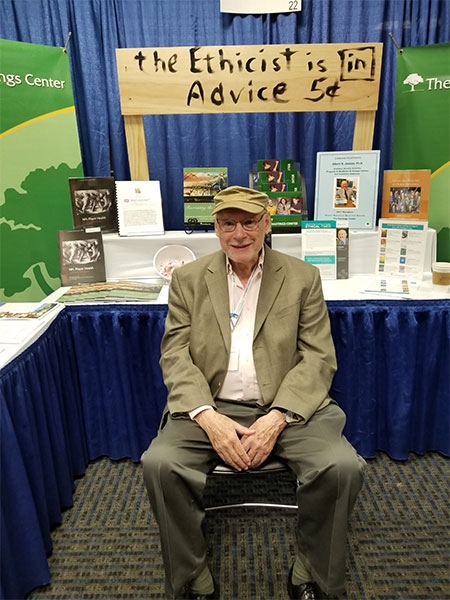In the late afternoon on Tuesday, Feb. 25, 2020, an email arrived in the inboxes of the nearly 450 people who subscribe to the academics listserv.
The Centers for Disease Control and Prevention had just announced that COVID-19 was heading toward pandemic status.
“FYI for anyone else tracking Corona-19 pandemic here is a helpful site,” read the subject line.
Sent by Robert Baker, the William D. Williams Professor of Philosophy Emeritus, the brief email was the first of dozens shared by Baker throughout the pandemic offering the latest COVID news and research.
Baker retired from Union in 2019 after 47 years. A bioethicist, he continues to review medical journals, work with physicians and teach medical students during the summer at the Clarkson University Icahn School of Medicine at Mount Sinai in New York City. As such, he is privy to a wealth of information on COVID from at least a dozen medical journals.
He wanted to share with his former colleagues at Union whatever he could about a developing global crisis that would evolve over the next two years.
“Advising others is integral to my profession,” said Baker. “More personally, after spending close to half a century at Union, I still identify as a faculty member, and I wanted to do what I could to keep my colleagues safe and to help the college successfully navigate the pandemic in a manner that would enhance its ability to flourish in the post-COVID pandemic era.”
Baker spends about 30 minutes each morning scanning the journals for any interesting news about COVID, from the effectiveness of wearing masks to the likelihood of kids getting an infection. He then spends another 30 minutes composing an email with a summary of what he has learned. Each email ends with his signature “bb,” often preceded by the instruction to “stay healthy, safe and sane.”
“My focus was determined by flow of information coming in, and what I thought would be of interest, or important, to faculty,” Baker said. “I was especially concerned to combat disinformation. Whenever possible, I provided data, and I tried to choose material with good graphics to make the data accessible to everyone. If there was an issue involving philosophy of medicine/biology or clinical or research ethics, I would explain technical terms or concepts in ways that I hoped were accessible and informative.”
In the beginning of the pandemic, Baker would send daily updates, sometimes more than once a day. While some were less than thrilled about the volume of emails clogging their inboxes, many were appreciative of Baker’s undertaking, often exchanging their own information or engaging in constructive debate.
Though Baker’s primary audience is faculty and staff, his reach extends beyond campus. Faculty spouses, friends of friends and even relatives in Israel and other places have shared his updates.
“Some people had personal problems that they consulted me about,” he said. “I was naturally sympathetic, but also mindful of the limits of my expertise. I had spent a year in medical school, and decades working as a volunteer clinical ethicist in local hospital. I routinely taught physicians, nurses and policymakers in short-term sessions. I also directed a graduate bioethics program part time, but I was not a physician. I usually provided relevant data, but I seldom gave personal advice.”
Three years into the pandemic, many parts of the globe has seen a decline in COVID cases after a sharp increase spurred by the omicron variant. Baker believes herd immunity is coming, either naturally and/or artificially through vaccines and boosters. He expects COVID will eventually shift to a manageable, endemic risk, like the seasonal flu.
In the meantime, he continues to share relevant updates, though his emails are much more infrequent now.
So when will Baker hit the send button on his updates for the final time?
“There is a famous last line in ‘Tractatus Logico-Philosophicus’ by Austrian philosopher Ludwig Wittgenstein,” said Baker. ‘Whereof one cannot speak, thereof one must be silent.’ When I cannot add anything significant to the conversation on COVID, I will take Wittgenstein’s advice.”
